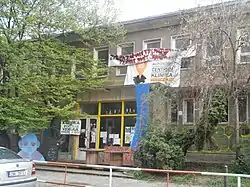Klinika
Klinika was a squatted self-managed social centre in Žižkov, Prague, from 2014 until 2019. It followed in the tradition of anarchist projects such as Ladronka and Milada.[1]
| Klinika | |
|---|---|
 Entrance to Klinika in 2016 | |
| General information | |
| Status | Evicted squat |
| Address | Jeseniova 60 |
| Town or city | Prague |
| Country | Czech Republic |
| Coordinates | 50.0877775°N 14.4663731°E |
| Opened | 2014 |
| Closed | 2019 |
| Website | |
| klinika | |
Occupation
The building was first occupied in 2014 as part of a housing rights demonstration. It was quickly evicted. A campaign then began which resulted in the Finance Minister offering a one year rent-free contract, which began on March 2, 2015. When the contract was not prolonged, the centre simply reverted to being squatted again after a solidarity demonstration of 2,000 people.[1] It then emerged that the owner, the Office for Government Representation in Property Affairs (Úřad pro zastupování státu ve věcech majetkových – ÚZSVM), was claiming the centre needed to be evicted because it was required for a different use, although no permits had been issued.[2]
Activities
Klinika was used by many different groups. It had a concert space, infoshop, library, bar and a large garden. Regular events included a community laundry, a creche, language lessons and solidarity events.[1][3]
Temporary closure
After demonstrations both for and against migration on February 6 2016, Klinika was attacked by a group of neo-Nazis. The next day there was a solidarity demonstration attended by 400 people.[4] A spokesperson for the project said “We sent 150 carloads of clothes and other things to Hungary, Croatia, Serbia – wherever we could help. We don’t have many refugees in the Czech Republic, so Klinika acts as a lightning rod for the anger in Czech society towards them.”[5] A court ruling then closed the centre but on appeal it was reopened again after a few weeks.[6]
Eviction
The centre was evicted in January 2019, despite the political support of Czech Young Greens and Democracy in Europe Movement 2025.[7][8] Unlike previous evictions, this time the building was then secured and not resquatted.[9][10] The authorities calculated the cost of the eviction as 1,640,000 Czech crowns (64,400 euros) and are attempting to recover the money from a member of the collective.[11]
References
- Savov, Nikolay (2016-04-21). "The Klinika squat: revitalizing anti-capitalism in Prague". Roar Magazine. Archived from the original on 2019-03-24. Retrieved 2019-03-21.
- Jandakova, Lenka (2016-03-11). "Czech activists file report of suspected crime after officials fail to produce permit used as pretext for denying them access to facility". Romea. Archived from the original on 2019-03-24. Retrieved 2019-03-21.
- Jůn, Dominik (2016-10-11). "Uncertainty as Klinika "Cultural Centre" site sold to railway administration". Radio Praha in English. Prague. Archived from the original on 2019-03-24. Retrieved 2019-03-25.
- "Autonomous social center Klinika attacked by Nazis". Libcom. 2016-02-07. Archived from the original on 2019-03-24. Retrieved 2019-03-21.
- McLaughlin, Daniel (2016-03-09). "Czechs diverge as anti-Islam bloc taps fear of refugees". Irish Times. Archived from the original on 2019-03-27. Retrieved 2019-03-21.
- Fraňková, Ruth (2016-07-07). "Prague's Klinika Social Centre Reopens on Thursday". Radio Praha in English. Archived from the original on 2019-03-26. Retrieved 2019-03-25.
- "Solidarity with Klinika!". Federation of Young European Greens. 2019. Archived from the original on 2019-07-09. Retrieved 2019-03-21.
- Stritesky, Lukas (2018). "How can we join the fight against gentrification?". Diem25. Archived from the original on 2019-07-09. Retrieved 2019-03-25.
- "Část Kliniky už je vyklizená, exekutor bude pokračovat v pátek. Aktivisté stále odmítají dům opustit". Česká Televize. 2019. Archived from the original on 2019-03-26. Retrieved 2019-03-25.
- "Notes from the eviction of Klinika". Enough is Enough. 2019. Archived from the original on 2019-03-24. Retrieved 2019-03-25.
- Novák, Arnošt (28 May 2020). "Every city needs a Klinika: The struggle for autonomy in the post-political city". Social Movement Studies. 20 (3): 276–291. doi:10.1080/14742837.2020.1770070. S2CID 219746673.